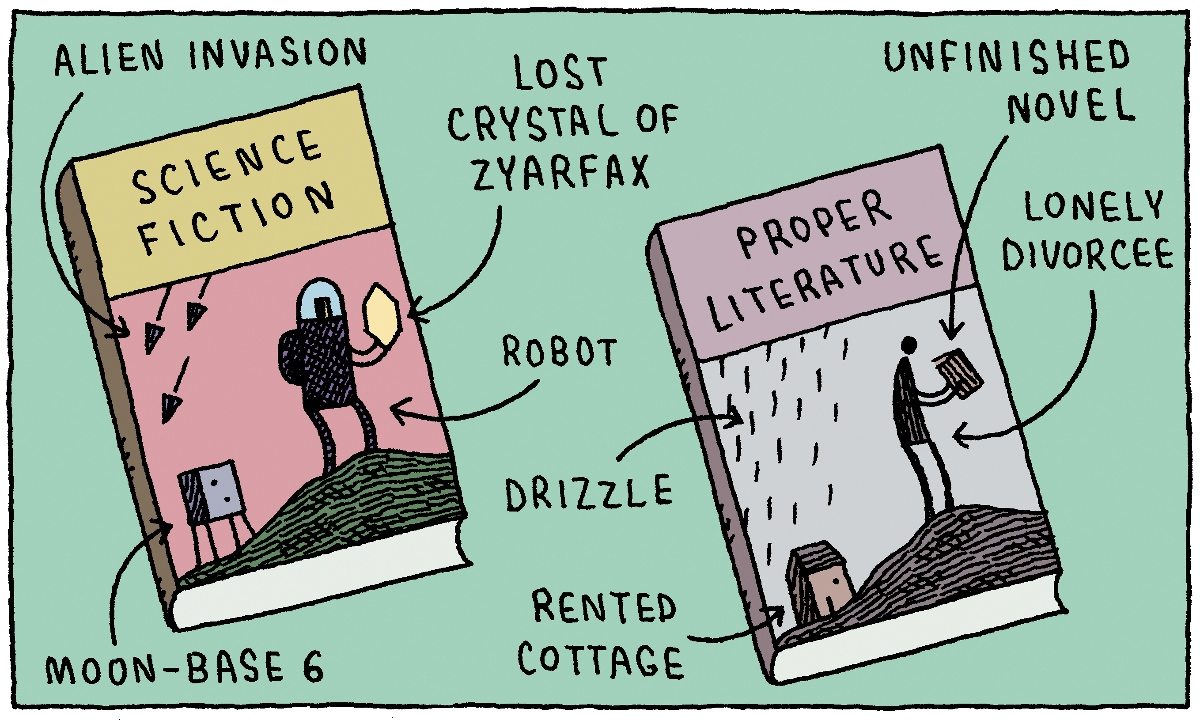
Following on from my “Stack Overflow” piece about the creeping of parallel universes into mainstream fiction, I began to notice more and more authors who are credited as writers of literary fiction dabbling in what can only be described as Science Fiction Fantasy.
There is endless debate about whether terms like literary fiction and genre fiction are useful. I don’t particularly feel that they are; fiction is just fiction, to my mind, but I undoubtedly find some books harder to read than others. The ones I find tricky often seem to garner all the literary plaudits. I’m not sure why a grueling read should carry more heft than a light, accessible one, but that’s probably a post for another day.
Here on GeekDad we cover a lot of accessible, page-turning novels, but less so the weighty stuff. This is partly because we’re parents writing for parents. If we free up time in our schedule to do something so decadent as read a book, we want it to deliver its payload before we collapse from exhaustion. Yet, as my children grow up and (theoretically) I’m getting more sleep, perhaps it’s time for something of a reading challenge. As I happened to notice a sudden influx of “literary” SFF into the marketplace, I thought I’d read some of the new titles and report back what I’d found. I also thought it would be fun to invite GeekDad readers along for the ride.
Over the next few weeks, and, let’s face it, probably months, I’m going to read and review the following novels. If you’d like to read them too and add to the discussion in the comments section then please do. If the posts prove popular, I’ll continue to search out new and interesting heavyweight SFF, and who knows what we’ll end up reading?
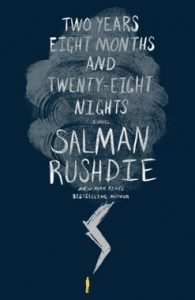 The first book on my list is the new release by Salman Rushdie, Two Years, Two Months and Twenty Eight Nights. I have a copy of Rushdie’s Midnight’s Children that I’ve had for longer than I’ve had children. It’s lived with me in four different places and still I haven’t opened it, and that’s despite this glowing review from one of my favorite authors, Jo Walton. For whatever reason, the book scares me. I definitely fear it’s a book that will send me to sleep, night after night.
The first book on my list is the new release by Salman Rushdie, Two Years, Two Months and Twenty Eight Nights. I have a copy of Rushdie’s Midnight’s Children that I’ve had for longer than I’ve had children. It’s lived with me in four different places and still I haven’t opened it, and that’s despite this glowing review from one of my favorite authors, Jo Walton. For whatever reason, the book scares me. I definitely fear it’s a book that will send me to sleep, night after night.
Two Years, Two Months and Twenty Eight Nights looks to be an altogether lighter proposition. It is inspired by Eastern “wonder” tales. Those who are good at math will have realized its title happens to be a total of 1001 nights. The dust jacket promises “a blend of history, mythology and a timeless love story. A lush richly layered novel in which our world has been plunged into an age of unreason.” With comic book heroes and superpowered babies mentioned in the blurb, not to mention the presence of immortal jinn, it sounds like a novel a book-loving geek will thoroughly enjoy.
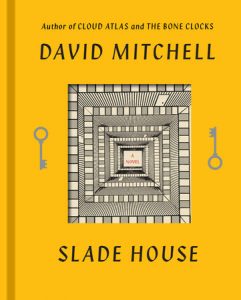 Next up is David Mitchell’s Slade House–a follow up to 2014’s body-swapping time-travel novel The Bone Clocks. Mitchell has been a favorite of mine since his debut Ghostwritten, and many of his novels have a speculative angle, most notably the highly acclaimed Cloud Atlas. Slade House is, according to Dean Koontz, “an eerie haunted-house tale that takes as much from quantum mechanics as from traditional supernatural lore, a spellbinding chiller about an unnatural greed for life and the arrogance of power.” Sounds good to me.
Next up is David Mitchell’s Slade House–a follow up to 2014’s body-swapping time-travel novel The Bone Clocks. Mitchell has been a favorite of mine since his debut Ghostwritten, and many of his novels have a speculative angle, most notably the highly acclaimed Cloud Atlas. Slade House is, according to Dean Koontz, “an eerie haunted-house tale that takes as much from quantum mechanics as from traditional supernatural lore, a spellbinding chiller about an unnatural greed for life and the arrogance of power.” Sounds good to me.
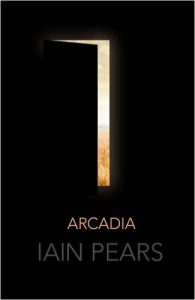 Iain Pears’ Arcadia is a house-brick of a novel coming in at over 600 pages. It promises multiple worlds including “a sun-drenched land of storytellers, prophecies and ritual.” With time-travel thrown into the blend and a “rebellious scientist trying to prove that time doesn’t exist,” it’s another book that ticks a lot of geek boxes.
Iain Pears’ Arcadia is a house-brick of a novel coming in at over 600 pages. It promises multiple worlds including “a sun-drenched land of storytellers, prophecies and ritual.” With time-travel thrown into the blend and a “rebellious scientist trying to prove that time doesn’t exist,” it’s another book that ticks a lot of geek boxes.
Added to that is the Arcadia app, which apparently allows you to chart multiple pathways through the book. I’m very intrigued to try this out. I’ve not read any Pears since 1997’s mesmerizing Instance of the Fingerpost, an altogether different, but still exceptional, novel.
Further on I hope to take in Michael Moorcock’s latest book The Whispering Swarm. Moorcock has more traditional SFF well and truly covered, but anybody who has read his Pyat Quartet will know he can out-literary the literati. The Whispering Swarm is set in an alternate London and features a young Moorcock as he feels the first stirrings of a passion for writing.
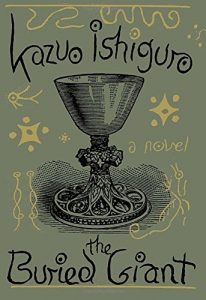 Kazuo Ishiguro has already made the crossover to SFF with Never Let Me Go. In his first novel in ten years, released earlier this year, Ishiguro turned to fantasy with The Buried Giant. There was lots of comment at the time of the novel’s publication, but for one reason or another the book itself passed me by. I’m looking forward to catching up and finding out whether it’s a true fantasy or something else altogether.
Kazuo Ishiguro has already made the crossover to SFF with Never Let Me Go. In his first novel in ten years, released earlier this year, Ishiguro turned to fantasy with The Buried Giant. There was lots of comment at the time of the novel’s publication, but for one reason or another the book itself passed me by. I’m looking forward to catching up and finding out whether it’s a true fantasy or something else altogether.
After that, who knows? I shall certainly keep reading. If the posts prove a success, then it would be great to carry on the theme, incorporating suggestions from GeekDad readers. Do let me know if you have any titles that would fit alongside those above. Also, please add to the comments which of the books interest you. Hopefully some lively discussion awaits us.
Right then, I’m off to catch some jinn. Until next time… happy reading.



Ehh. Really, the only real distinction between genre fiction and “true literature” has always been more a matter of perception and marketing more than anything else. I mean, just look at Kurt Vonnegut.
I agree. It may just be a coincidence that I’ve noticed this trend now and that it’s not a trend at all. There could well always be somebody producing work like this. As we look back through time, it’s only authors of the quality of Vonnegut that stand out, as the rest fall by the wayside.
If you don’t mind me asking, how do you have a copy of Arcadia? I’ll be waiting with interest to hear your opinion. Iain Pears is one of my favorite authors of all time, for “Instance” and “Dream of Scipio.”
I asked the publisher nicely if they’d like to be included in this piece, so they sent me a copy, but it is out in the UK. For at least a month I think.
For what it’s worth, I noticed a very similar trend in apocalyptic/post-apocalyptic science fiction that I began calling “Literary Apocalyptic.” Some examples I’ve read in the last year include: Emily St. John Mandel’s, “Station Eleven,” Karen Walker’s, “The Age of Miracles,” Michael Faber’s, “The Book of Strange New Things,” and my favorite, Jeff Vandermeer’s The Southern Reach Trilogy (“Annihilation,” “Authority,” and “Acceptance.” Though she is certainly not new to the genre, I’m currently reading Margaret Atwood’s recent “The Heart Goes Last.” Anyway, it’s an interesting phenomenon.